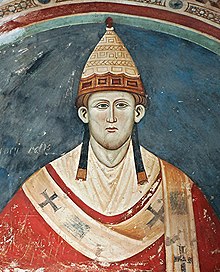Pope
The pope (Latin: papa, from Ancient Greek: πάππας, páppas, 'father'), also known as the supreme pontiff, Roman pontiff or sovereign pontiff, is the bishop of Rome (or historically the patriarch of Rome), head of the worldwide Roman Catholic Church, and has also served as the head of state or sovereign of the Papal States and later the Vatican City State since the eighth century. From a Roman Catholic viewpoint, the primacy of the bishop of Rome is largely derived from his role as the apostolic successor to Saint Peter, to whom primacy was conferred by Jesus, who gave Peter the Keys of Heaven and the powers of "binding and loosing", naming him as the "rock" upon which the Church would be built. The current pope is Pope Francis, who was elected on 13 March 2013.

Quotes
edit- In 1054, the patriarch of Constantinople and the pope excommunicated each other. That was the end of holiness for both churches. After that, they became instruments of Satan. I'm convinced of it.
- Frank Herbert, The White Plague (1982)
- On the East–West Schism
Classical and Foreign Quotations
edit- Quotes reported in: W. F. H. King, ed., Classical and Foreign Quotations, 3rd ed. (1904), nos. 1934, 3082; 2558; 1444; 2516
- On n’a point pour la mort de dispense de Rome.
- There is no dispensation at Rome to be had against death.
- Molière L’Etourdi, 2, 4, (Anselme loq.).
- Nemo impetrare potest a Papa bullam nunquam moriendi.
- There is no dispensation to be obtained from the Pope against death.
- Ascribed to Thomas à Kempis.
- Sint licet assumpti juvenes ad pontificatum,
Petri annos potuit nemo videre tamen. - Though many Popes of youthful age have reigned,
None to the years of Peter have attained.- Guilielmus Burius, Brevis Romanor (Mechlin: Pontificum Notitia, 1675), p. 259.
- This distich of Burio’s represents an unquestionable truth. Pius IX, elected ætatis suæ fifty-four, and Leo XIII, in his sixty-ninth year, have alone exceeded the traditional “twenty-five years” of the Prince of the Apostles; since Benedict XIII, although he survived his election by thirty years, was deposed by the Council of Constance (1415) in the twenty-first of his pontificate. On the other hand, juvenile elections have not been attended by long reigns. Alexander I, chosen at twenty (109 AD), reigned 10 years 7 months. John XI, made Pope at twenty-five (931 AD), reigned 4 years 10 months. John XII, the “Boy Pope,” elected at the unusually early age of sixteen,—who, by the way, personally invested St Dunstan with the Pallium,—reigned only 7 years 9 months, being a mere youth when he died; and Gregory V, who ascended the throne at twenty-four, occupied St Peter’s chair less than three years, 996-999 AD. The formula, Non videbis annos Petri (“Thou shalt not see the years of Peter”), supposed to be addressed to each successive Pope at his coronation, is a myth, and so is the tapping the forehead of each defunct Pope with a silver (or ivory) mallet by the Cardinal Camerlengo in certification of his decease. On the death of Leo XIII the legend was once more circulated, and was authoritatively denied.
- Lumen in Cælo.
- Light in the Heavens.
- Motto assigned to the Pontificate of Leo XIII in the Prophecies of St Malachy.
- Those prophecies were first published in Venice, 1591 (and again in 1595), by the Benedictine Arnold Wyon (or Wion), who himself suspected their genuineness. The list, designed to reach to the end of the world, is not yet exhausted, and allows Pius X nine successors, extending to about the end of the century: the remaining Popes being respectively indicated by the mottoes Religio depopulata, Fides intrepida, Pastor angelicus, Pastor et nauta, Flos florum, De imedietate lune, De labore solis, and the Gloria olivæ of a “Peter the Second,” who will assist at the destruction of Rome and the consummation of all things generally. Occasionally, but only occasionally, “St Malachy” makes a lucky shot. Peregrinus apostolicus aptly describes the enforced “wanderings” of Pius VI, until his death, in a foreign land, at Valence in 1799. “Aquila rapax” falls in with the carrying off to Paris of Pius VII by (the “Eagle”) Napoleon in 1804; and Pio Nono’s “Crux de Cruce” found interpretation in the “cross” which he suffered from the heraldic “Cross” of the house of Savoy. The flaming comet borne in the Pecci family arms presents another curious coincidence in the Lumen de cælo of Leo XIII. The devise of Pius X is Ignis ardens, regarding which no satisfactory explanation has as yet been found.
- Sic transit gloria mundi.
- Thus the glory of this world passeth away.
- The words were (prior to 1963) recited in one of the most impressive portions of the ceremonial attending the Pope’s coronation. Proceeding from the Sagristia of St Peter’s in his sedia gestatoria, the Pope-elect and his procession halted three times on the way—once always before St Peter’s statue—and on each occasion a silver reed bearing a lock of tow at its summit was ignited and raised aloft by one of the Masters of the Ceremonies, who, as the tow flared away in its socket, said, Sancte Pater, sic transit gloria mundi! It is said that when the customary words were addressed to Sixtus V (1 May 1585), he exclaimed, “Our glory shall never pass away, for we have no other glory than to do righteous judgment!” In the Imitation (1, 3, 6) is, O quam cito transit gloria mundi!—“Oh! how quickly the glory of this world passes away!”